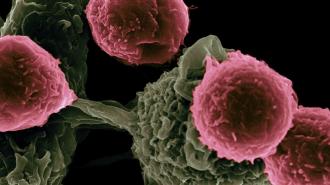The microbes living in your food can affect your risk of cancer. While some help your body fight cancer, others help tumors evolve and grow.
Gut microbes can influence your cancer risk by changing how your cells behave. Many cancer-protective microbes support normal, cooperative behavior of cells. Meanwhile, cancer-inducing microbes undermine cellular cooperation and increase your risk of cancer in the process.
We are evolutionary biologists who study how cooperation and conflict occur inside the human body, including the ways cancer can evolve to exploit the body. Our systematic review examines how diet and the microbiome affect the ways the cells in your body interact with each other and either increase or decrease your risk of cancer.
Cancer is a breakdown of cell cooperation
Every human body is a symphony of multicellular cooperation. Thirty trillion cells cooperate and coordinate with each other to make us viable multicellular organisms.
For multicellular cooperation to work, cells must engage in behaviors that serve the collective. These include controlled cell division, proper cell death, resource sharing, division of labor and protection of the extracellular environment. Multicellular cooperation is what allows the body to function effectively. If genetic mutations interfere with these proper behaviors, they can lead to the breakdown of cellular cooperation and the emergence of cancer.
Cancer cells can be thought of as cellular cheaters because they do not follow the rules of cooperative behavior. They mutate uncontrollably, evade cell death and take up excessive resources at the expense of the other cells. As these cheater cells replicate, cancer in the body begins to grow.
Cancer is fundamentally a problem of having multiple cells living together in one organism. As such, it has been around since the origins of multicellular life. This means that cancer suppression mechanisms have been evolving for hundreds of millions of years to help keep would-be cancer cells in check. Cells monitor themselves for mutations and induce cell death, also known as apoptosis, when necessary. Cells also monitor their neighbors for evidence of abnormal behavior, sending signals to aberrant cells to induce apoptosis. In addition, the body’s immune system monitors tissues for cancer cells to destroy them.
Cells that are able to evade detection, avoid apoptosis and replicate quickly have an evolutionary advantage within the body over cells that behave normally. This process within the body, called somatic evolution, is what leads cancer cells to grow and make people sick.
Microbes can help or hinder cell cooperation
Microbes can affect cancer risk through changing the ways that the cells of the body interact with one another.
Some microbes can protect against cancer by helping maintain a healthy environment in the gut, reducing inflammation and DNA damage, and even by directly limiting tumor growth. Cancer-protective microbes like Lactobacillus pentosus, Lactobacillus gasseri and Bifidobacterium bifidum are found in the environment and different foods, and can live in the gut. These microbes promote cooperation among cells and limit the function of cheating cells by strengthening the body’s cancer defenses. Lactobacillus acidophilus, for example, increases the production of a protein called IL-12 that stimulates immune cells to act against tumors and suppress their growth.
Other microbes can promote cancer by inducing mutations in healthy cells that make it more likely for cellular cheaters to emerge and outcompete cooperative cells. Cancer-inducing microbes such as Enterococcus faecalis, Helicobacter pylori and Papillomavirus are associated with increased tumor burden and cancer progression. They can release toxins that damage DNA, change gene expression and increase the proliferation of tumor cells. Helicobacter pylori, for example, can induce cancer by secreting a protein called Tipα that can penetrate cells, alter their gene expression and drive gastric cancer.
Healthy diet with cancer-protective microbes
Because what you eat determines the amount of cancer-inducing and cancer-preventing microbes inside your body, we believe that the microbes we consume and cultivate are an important component of a healthy diet.
Beneficial microbes are typically found in fermented and plant-based diets, which include foods like vegetables, fruits, yogurt and whole grains. These foods have high nutritional value and contain microbes that increase the immune system’s ability to fight cancer and lower overall inflammation. High-fiber foods are prebiotic in the sense that they provide resources that help beneficial microbes thrive and subsequently provide benefits for their hosts. Many cancer-fighting microbes are abundantly present in fermented and high-fiber foods.
In contrast, harmful microbes can be found in highly-processed and meat-based diets. The Western diet, for example, contains an abundance of red and processed meats, fried food and high-sugar foods. It has been long known that meat-based diets are linked to higher cancer prevalence, and that red meat is a carcinogen. Studies have shown that meat-based diets are associated with cancer-inducing microbes including Fusobacteria and Peptostreptococcus in both humans and other species.
Microbes can enhance or interfere with how the body’s cells cooperate to prevent cancer. We believe that purposefully cultivating a microbiome that promotes cooperation among our cells can help reduce cancer risk.
This article is republished from The Conversation under a Creative Commons license. Read the original article.






